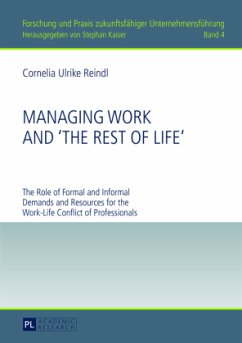Successfully managing needs and obligations of work and non-work spheres in order to maintain psychological and physical well-being is one of the most prominent challenges of today's working life. Unsatisfactory reconciliation of life roles, i.e. work-life conflict, is associated with a variety of negative outcomes for the individual as well as for organizations. One branch where heavy workload and intense time demands are particularly prone to collide with personal life interests and needs are professional service firms (PSFs). The present study empirically examines the impact of a set of formal and informal organizational demands and resources on the work-life conflict of professionals in PSFs. Above and beyond (formal) work-life initiatives, results highlight the crucial role of a supportive organizational culture for achieving successful management of work and non-work roles.








